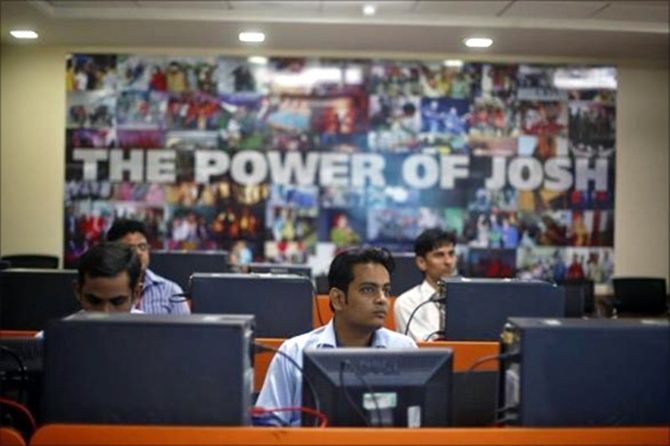Evaluation gets tougher as companies battle uncertain macro conditions and automation.
 The information technology (IT) services sector is increasingly looking at stricter performance evaluation.
The information technology (IT) services sector is increasingly looking at stricter performance evaluation.
This comes in the background of growth being impacted due to macro economic conditions and the increasing use of automation and technologies such as artificial intelligence.
According to a recent news report, Infosys, the country’s second largest IT service provider, dismissed 500 employees.
The story said some of them could not complete the required 9.15 hours of daily work.
Infosys says the reason for these exits are no different from what they'd been following in the past.
“We have a progressive policy for the rare instances where some of our employees do not meet expected standards of performance or commitments. After adequate counselling, those found consistently deviating from expectations are asked to find alternative employment. This applies to employees across levels and is not connected with any business situation that is not in the control of the employee. The numbers are very low and this is no different from what we have done in the past,” said the company.
Indian IT is the largest employer of engineers in the country. The total employee base of the sector touched 3.7 million in 2015-16.
Nasscom, the body representing the industry, has also hinted at a lower hiring trend. The sector added 200,000 employees in FY16, compared with 230,000 in FY15.
For FY17, the expected employee addition is around 200,000.
Analysts say 'pink slips' have become a norm as growth tapers and processes get automated, though not en masse.
“Pink slips made a comeback a year before. One reason is growth in demand coming down and, two, there is no linear relation between growth and headcount. A lot of processes are also getting automated,” said Kris Lakshmikanth, founder and managing director, Head Hunters India, an executive search firm.
He says employees on the bench (the sector's term for those not assigned to any project) are more vulnerable.
“If you are on the bench for three months, companies send those employees for a performance improvement programme. If you are not billable for six months, you will be asked to go. This has been a common practice at multinational corporations such as IBM. Lately Indian IT firms are also following this,” he added.
A M Naik, chairman of Larsen & Toubro and non-executive vice-chairman of L&T Infotech, had said the latter's Initial Public Offer that its 18.5 per cent staff attrition rate wasn't voluntary.
“Over the years, we have continuously become more efficient by use of technology and various tools, and as we hire talent that caters to new technology. Some people cannot cope with such changes. So, the 18.5 per cent attrition does not represent voluntary retirement or voluntary resignation. Less than 12 per cent of people normally leave voluntarily. The rest become obsolete, either due to inefficiency or lack of technological knowledge,” he said.
Companies are also moving away from a bell curve appraisal system to a process that tracks employee performance regularly.
Tata Consultancy Services and Infosys, as also global players IBM and Accenture, have moved away from the former system to one of regular feedback, not simple once or twice a year.
IBM has done away with annual appraisals, for a new system called Checkpoint.
This considers different dimensions of an employee's performance - business results, impact on client success, innovation, personal responsibility to others, skills.
The sector is also trying to upgrade the skill levels of its employees as it faces the challenge of digital disruption, with newer technologies assuming far more importance at clients' business environment.
For instance, TCS, the country's largest IT services provider, is training 100,000 employees on digital technology.
Infosys had announced it would train 40 per cent of its workforce in design thinking.
Pravin Rao, operations head at Infosys, in an earlier interview, said they wanted to leverage the benefits of automation, particularly at a lateral level. And, figure out how to do more of just-in-time hiring at fresher level.
"On an average last year, we did lateral hiring of 2,500-3,000 every quarter but with more and more fulltime employee equivalents being released through automation, and automation benefits kicking in, we would expect to see some reduction in the hiring numbers," he said.
Says Lakshmikanth: “Recently, one of the top four IT services firms sacked an employee who was with them for six years. The reason given was performance. The employee approached the labour court because for the last 15 years, his performance evaluation was above average and suddenly in the 16th year, it was low. He challenged this decision and the company had to reinstate him. Companies will look at the mid-manager level, especially employees in the 35-45 age group, more closely. They have the option to promote a younger person with a lower salary to that position.”
Constant feedback
Companies are also moving away from a bell curve appraisal system to a process that tracks employee performance regularly.
Tata Consultancy Services (TCS), Infosys, IBM and Accenture, have moved away from the former system to one of regular feedback.
IBM has done away with annual appraisals, for a new system called Checkpoint.
This considers different dimensions of an employee's performance - business results, impact on client success, innovation, personal responsibility, and other skills.
The sector is also trying to upgrade the skill levels of its employees as it faces the challenge of digital disruption, with newer technologies assuming far more importance at clients' business environment.
For instance, TCS, the country's largest IT services provider, is training 100,000 employees on digital technology.
Infosys had announced it would train 40 per cent of its workforce in design thinking.
Pravin Rao, operations head at Infosys, in an earlier interview, said they wanted to leverage the benefits of automation, particularly at a lateral level and figure out how to do more of just-in-time hiring at fresher level.
"On an average last year, we did lateral hiring of 2,500-3,000 every quarter but with more and more fulltime employee equivalents being released through automation, and automation benefits kicking in, we would expect to see some reduction in the hiring numbers," he said.
THE NORM IN THE SECTOR
- Infosys dismissed 500 employees, according to a recent news report
- Nasscom, the body representing the industry, has also hinted at a lower hiring trend
- Analysts say ‘pink slips’ have become a norm as growth tapers and processes get automated, though not en masse
- Companies are moving away from a bell curve appraisal system to a process that tracks staff performance regularly
Photograph: Reuters








